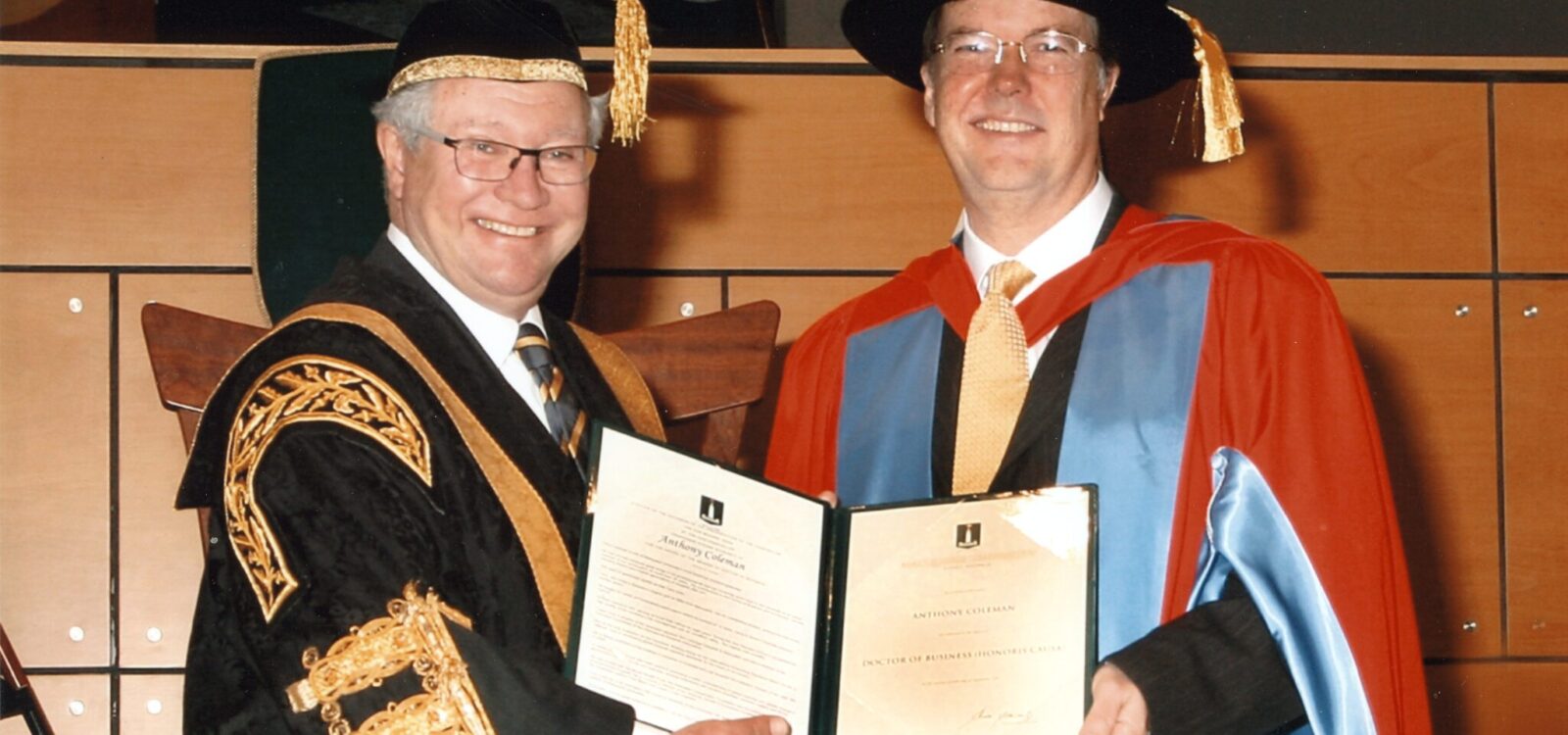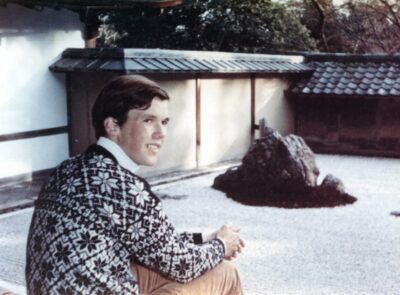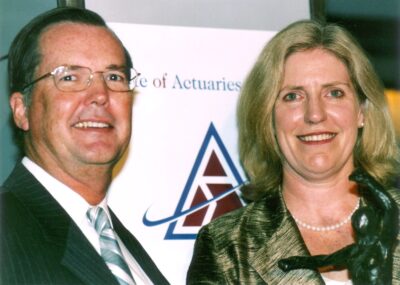
Under the Spotlight with Tony Coleman
With a career spanning over 50 years, Tony Coleman has been a cornerstone in the actuarial field.
In this exclusive Under the Spotlight feature, Tony shares some of his learnings from experience in high-level roles – including director, senior executive and advisor across the private, public and non-profit sectors in Australia and overseas – and how actuarial expertise can help build a better way forward.
For those who don’t know you, could you share a bit about yourself and your professional background?
Over 50 years ago, I began my actuarial studies and, since then, I’ve worked at companies like MLC, Australian Bank (bought by CBA in 1985), PwC and IAG. For the last 16 or so years, I’ve worked as an independent consultant and director.

What has been the most challenging project you’ve worked on?
There have been quite a few challenges over the years. Notably, the greatest professional challenges include: when I acted as the independent actuary to the demutualisation of NRMA Insurance (now IAG) in 2000; and, during my time as President of the Actuaries Institute, when HIH (then the second-largest insurer in Australia) became insolvent in 2001.
The demutualisation of NRMA Insurance involved designing a process and formula that balanced the interests of customers, members of the insurer and a majority of the parent entity’s board against the objections of a minority of NRMA board directors, to ensure that both NRMA Insurance and NRMA would be completely viable entities following the insurer’s demutualisation.
1.65 million copies of the final report were mailed out to NRMA Insurance members to secure their approval for the demutualisation deal in a vote. The HIH insolvency led to my involvement in promoting a process of wholesale reform of prudential regulation and accounting standards for general (non-life) insurance in Australia from 2002 to 2006, which later influenced regulatory and accounting reform internationally.

This ultimately culminated in the release of IFRS 17 in 2017 and its adoption in 2023. At the same time, I was explaining to the media after the collapse what had gone wrong and worked alongside the HIH Royal Commission to address the issues arising.
More recently, providing independent evidence in a court hearing that helped to secure a legal order to stop the large new Waratah Coal Mine proceeding in Queensland on adverse climate impact grounds was also a rewarding challenge.
The common factor in securing good outcomes to all these challenges was being able to communicate and work effectively with large groups of people – usually with no actuarial backgrounds – to deliver solutions that made good sense, based upon rational judgement which balanced the interests of various stakeholders.
In the end, these skills were critical to getting things done. Sometimes the mindset to be different and independent leads others to the right conclusion.
At a personal level, surviving two different cancers at ages 37 and 58 was also challenging.
After working on some major events in Australian history, what did you learn from the events and what do they say about the nature of the actuarial profession?
I think that actuaries can best contribute to public policy issues by maintaining independence and doing what actuaries do best – analysing the data to ascertain the key issues and providing good advice to those making decisions.
I think that has been exemplified over recent years by significant contributions made to the development and operation of the NDIS by John Walsh, Sarah Johnson, and Estelle Pearson, to name a few.
In my case, my former involvement in the establishment and development of the Macquarie University Centre for the Health Economy (MUCHE) was based on the belief that health economists and actuaries had much to contribute to this field.
MUCHE has been quite successful in conducting academic research and providing consulting services to both Federal and State Governments, particularly in advising on the efficacy and cost-effectiveness of new pharmaceutical drugs and medical devices before these are given financial support by the Federal Government under the Pharmaceutical Benefits Scheme (PBS).
I have lived to see – among other things – man’s landing on the moon in 1969, the oil crisis of 1973, the financial crash of 1987, the fall of the Berlin Wall in 1990, the recession Australia “had to have” in 1991, the Asian financial crisis of 1997, the failure of Long Term Capital Management in 1998, the dot-com meltdown in 2001, scandal of Enron and the collapse of Arthur Andersen in 2002, the global financial crisis of 2008, and the COVID pandemic in 2020-21.
The evident conclusion for actuaries is that major unexpected crises are actually quite common – to the point where we should expect a major crisis of some kind every few years!
Given that the next crisis is not usually predicted or expected, the second lesson for actuaries is that looking after an organisation’s resilience and risk management is vital when the next crisis comes. The ability to imagine what could happen, even when it has not happened before, and ask oneself “What would we do if that happened?”
In my experience, the importance of a simple but insightful question should not be underestimated. Often, the traditional risk management checklist approach used by many, fails to factor in this level of thinking.
What are the most pressing issues for actuaries?
This will depend upon each individual actuary’s perception of what problems need solving and their interest in addressing them.
Certainly, climate change is a pressing issue – including the increasing unaffordability of insurance – and will remain so for some time. This may well even extend to increasing risks of wars based on failing sources of water currently derived from snow melt in SE Asia and too much sea water in other places leading to climate refugees from sea-level rise.
Other issues include falling birth rates, ageing populations and how to fund increased demand for aged care, artificial intelligence, data mining versus privacy, cyber security risks and increasing levels of social inequity in Australia, as reflected in the frequent debates about the cost of housing and rentals.
What is the most valuable skill an actuary can possess?
The ability to influence others, by using good listening and communication skills is a most valuable skill. Another powerful tool is asking questions that pose plausible possible future scenarios or outcomes.
Very few people take the time to really listen to another person and shape their responses and communication to seek an outcome that is beneficial – or at least satisfactory – to all stakeholders. In my experience, listening first is vital to avoid hidden agendas and to also defuse egos. It also allows the ability to go into controversial situations with an open mind.
Sometimes it is hard to be independent and to stick up for what is right or reasonable based upon analysis, principles and facts, especially in a social-media-obsessed world that is sometimes driven by perceptions rather than reality. Nevertheless, as one gets more mature, one comes to realise that substance and truth are more important in the long term.

What should all actuaries do at least once?
Enjoy travelling to broaden your horizons and go sailing – preferably racing!
I have been fortunate to travel widely, and I have skippered racing sailboats all my life. I find the challenge of getting a team of people to perform and harness the forces of nature when racing a yacht is every bit as interesting and complicated as working as an actuary – it is a bit like playing chess on water!
It is also telling that many common phrases used in everyday life and business are derived from sailing, such as “above board”, “all hands on deck”, and “learning the ropes”.
When you retire, what will your legacy be?
I would have to say that one key legacy is the current regulatory framework and accounting standards applicable to general and health insurance in Australia that arose post-HIH.
This includes the use of risk margins in insurance liability valuations and the requirement for annual Financial Condition Reports for non-life insurers, both of which were introduced with my active participation and support from the Actuaries Institute.
I was also heavily involved for several years in advising the International Accounting Standards Board (IASB) on the development of IFRS 17 which, for non-life insurers, is remarkably similar to the Accounting Standard AASB 1023, developed in Australia post-HIH. IFRS 17 also saw the concept of risk margins migrate to all forms of insurance, so I feel that is also a considerable legacy that has become international.
A second legacy that I am also proud of is the role I played as a Director of Low Carbon Australia (LCA) from 2009 to 2014, and more generally as an advocate for action on climate change since 2002. LCA was an Australian government-owned entity founded as a start-up in 2009 that focused on co-investing $100 million with the private sector in a range of energy-efficient carbon emission reduction projects.
As a Founding Director of LCA, I was instrumental in hiring the CEO, COO and CFO and guiding the organisation through its start-up phase to achieve financial sustainability without any further government support. LCA met all KPIs set for it by 30 June 2013.
In all, LCA catalysed projects valued at some $320 million and achieved carbon emission reductions at an overall negative cost of $2 per tonne. This was achieved despite a very contentious political environment prevailing in Australia on this issue at that time. LCA came to be seen by the Government as a successful pilot program that should be scaled up and was merged into the then newly created Clean Energy Finance Corporation in late 2014, which has gone on to fulfil a significant role in financing the de-carbonisation of Australia’s energy systems.
What advice would you give to aspiring actuaries?
Reflecting upon my career, I have certainly enjoyed it. I have had the opportunity to work with some amazing people on many worthwhile challenges.
I have never regretted the decision to become an actuary and I am sure the profession remains just as relevant to solving the problems of tomorrow’s society and world as it has been during my career.
I would also encourage aspiring actuaries to be different, to try things that haven’t been done before. As such, I was the first actuary in Australia to work for a chartered accounting firm back in 1985. I was also the first CRO at IAG – which I found to be a very interesting challenge.
Both presented many opportunities that I never would have had if I had pursued a more conventional actuarial career.
I think the phrase “Beyond Uncertainty – Turning Risk into Value” remains relevant as a guiding principle for actuaries today, including those involved in newer disciplines such as data mining and artificial intelligence. This is especially the case when professionalism and ethics are combined with strong technical knowledge and a capacity to work with both actuarial and non-actuarial colleagues to build a better way forward.
There is certainly no shortage of problems still needing to be addressed to find better solutions. So, in parting, my advice for aspiring actuaries would be to enjoy working with others, particularly where uncertainty exists, and to use your skills to build alliances that can solve the world’s problems.
CPD: Actuaries Institute Members can claim two CPD points for every hour of reading articles on Actuaries Digital.






